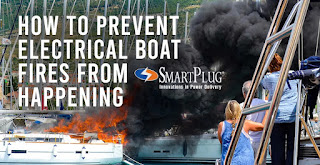How To Prevent Electrical Boat Fires From Happening
 Outdated shore power plugs and inlets are prone to salt, corrosion,
and moisture. All these factors can contribute to arcing, which damages
the contacts and eventually leads to increased resistance and heat
accumulation.
Outdated shore power plugs and inlets are prone to salt, corrosion,
and moisture. All these factors can contribute to arcing, which damages
the contacts and eventually leads to increased resistance and heat
accumulation.
This is especially important when you realize that the typical shore power cord relies on the combination of twist-lock plug blades and a locking-ring mechanism. This constant twisting motion predisposes the cord to excessive heating.
But what about loose connections? It’s a factor some boat owners don’t give too much thought to. Yet, it’s a major cause of electrical boat fires.
Why?
Antiquated Technology: Oftentimes it’s difficult for boat owners to securely connect the cords due to the tedious, twist-lock design functionality. Having a plug that doesn’t plug straight typically doesn’t create a tight enough connection.
Corrosion: Another contributing factor to electrical boat fires is corrosion. Sometimes shore power cords accidentally end up in the water or get sprayed by the salt water. You’re dealing with salt water and when it dries out you’re left with salt crystals which leads to corrosion in both the inlets and the outlets. Friction starts in the electrical circuit, and with it comes resistance.
Resistance: The real danger occurs when these scenarios continue to happen over time. Increased resistance generates more and more heat. Left unchecked, the heat builds up until the outlet smolders and bursts into flames.
These scenarios happen all the time, but they can be prevented.
Get More info Click Here : best boat accessories


Comments
Post a Comment